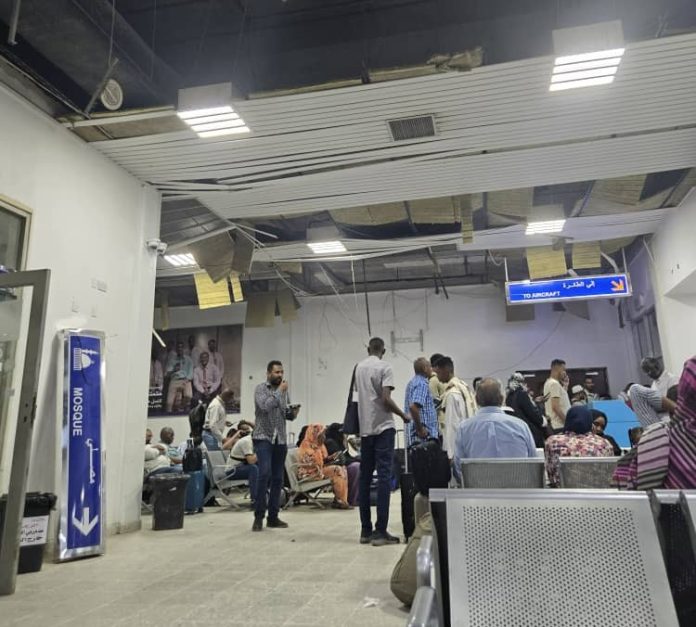Smoke hangs in the air above Port Sudan as Sudanese authorities struggle to contain fires caused by a series of drone attacks that have ravaged the city for three days, reports the Middle East Eye. Port Sudan is currently Sudan’s de facto capital and home of its army-backed government, which blames the paramilitary Rapid Support Forces (RSF) and its “regional sponsor”, the United Arab Emirates, for drone strikes that began early on Sunday morning.
On Tuesday, Sudan’s security and defence council announced it was cutting off diplomatic ties with the UAE over its support for the RSF, a day after the International Court of Justice (ICJ) dismissed a Sudanese case accusing Abu Dhabi of complicity in genocide.
Mutasim Ali, legal adviser at the Raoul Wallenberg Centre for Human Rights, condemned the decision.
“The international community, through the ICJ, was offered yet again another opportunity to prevent and stop an unfolding genocide,” he told MEE.
“While there remains hope in exploring alternative accountability strategies, the RSF and the UAE will now continue to commit egregious atrocities, without the immediate prospect of intervention.”
The RSF, which has been at war with the Sudanese Armed Forces (SAF) since April 2023, has not yet claimed responsibility for the Port Sudan attacks, while the UAE has strongly condemned them.
Attacks began early on Sunday morning, when drones struck Sudan’s last functioning civilian international airport, destroying parts of its roof and leaving its interior partially damaged.
The aircraft, which a Sudanese army spokesperson identified as “kamikaze drones” and which regional military and diplomatic sources said are known to have been previously purchased by the UAE, also attacked the nearby Osman Digna air base.
The Sudanese government, which is aligned with the SAF, closed the airport on Sunday, before opening it again on Monday. A fresh drone attack the next morning prompted its closure once again. Drones also struck a fuel depot 20km from downtown Port Sudan, causing a huge fire that authorities were still trying to contain on Tuesday, before shifting focus to a fuel store at the port.
The port on the Red Sea is Sudan’s largest and the main hub for humanitarian aid being shipped into the country, as well as for commercial traffic.
Sources at the port told Middle East Eye that the southern terminal, which is the port’s container terminal, has been shut down and is “basically not functioning”.
A fire caused by the targeting of the terminal’s fuel store is still raging. Drones also struck Port Sudan’s main power plant, causing a complete power outage across the city. The Marina Hotel, which has been hosting Egyptian and Saudi Arabian diplomats and is only a few metres from the offices of SAF leader Abdel Fattah al-Burhan, was also hit, causing limited damage.
As fires spread from the fuel stores, fear and unease could be felt across Port Sudan, which is currently hosting at least 500,000 people displaced by the war. The city has been a military stronghold and de facto capital since the conflict engulfed Khartoum two years ago. “The situation is deteriorating because there is no power,” one resident told MEE. Another said the RSF had “fucked the city.”
Most of Port Sudan’s schools have been shut, there are long queues for fuel and the bakeries are closed.
On Tuesday, a government official said that the attacks on the fuel depots alone had caused at least half a billion dollars’ worth of damage.
Following army gains in Khartoum and other parts of central Sudan – and with the upcoming arrival of the rainy season – Sudan’s war is increasingly becoming dominated by drones. The Sudanese army carried out its own drone strikes on a cargo aircraft at Nyala airport in South Darfur.
Military support has been flown into Nyala, including Chinese-made drones that, according to Yale’s Humanitarian Research Lab, are “consistent with FH-95s” bought by the UAE.
“The timing of the attacks and the escalation in Port Sudan might be related to the UAE having a gloves-off approach and the RSF following suit,” Kholood Khair, a Sudanese analyst and founder of the Confluence Advisory think tank, told MEE.
Khair said the drone attacks in Nyala and Port Sudan highlighted the “international nature” of the war. “The UAE won’t stop supplying the RSF, but there are signs the RSF is getting a lot more of its weaponry now from private military suppliers,” Khair said, adding that diplomatic attempts from the US to get Abu Dhabi to put pressure on the paramilitary group to stop committing atrocities were not working.
Khair noted Emirati attempts – some of which have come through the Israeli media – to paint the Sudanese army as a “jihadi group closely linked to Hamas”. “The point is not to prove it’s true, it’s to say it’s possible,” Khair said.
Khair added that the UAE is “taking advantage of the carte blanche that Israel, one of its closest allies in the region, enjoys” and also “trying to exploit the Sudanese army’s dependence on Islamist groups,” referring to groups such as al-Bara bin Malik brigade, which has been fighting alongside the army.
In its response to the Port Sudan attacks, the UAE’s foreign ministry said: “The United Arab Emirates has condemned in the strongest terms the targeting of vital civilian facilities and critical infrastructure in Port Sudan and Kassala, denouncing such acts as a blatant violation of international humanitarian law.”




